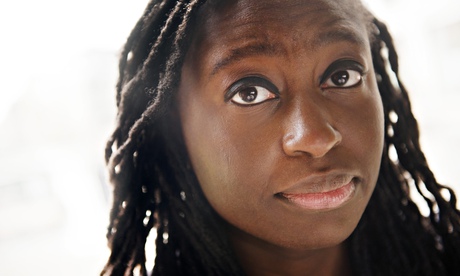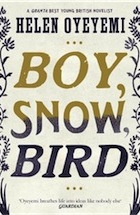The Nigerian-born novelist on the feminine gaze, wicked stepmothers and the phenomenon of 'passing'

Helen Oyeyemi: 'I wanted to look at the aesthetics of beauty – who gets to be the fairest of them all?' Photograph: Linda Nylind for the Guardian
Born in Nigeria in 1984, Helen Oyeyemi, 29, moved to London with her family aged four. She signed a publishing deal while still at school and her first novel, The Icarus Girl, a ghost story about an eight-year-old girl torn between her British and Nigerian identity, received rave reviews. She followed it with Cuban-themed The Opposite House, while studying social and political sciences at Cambridge, and White is for Witching, about teenage twins, which won a 2010 Somerset Maugham award. Her next book, Mr Fox, featuring an American writer with a penchant for murdering his heroines, was a riff on the Bluebeard story. Named a Granta best young novelist in 2013, she published her fifth novel, Boy, Snow, Bird, last week (Picador, £12.99). After sojourns in New York, Paris, Budapest and Berlin, she now lives in Prague.
 Boy, Snow, Bird is set in 1950s America, in both the white and black community. And yet it has the quality of a fairytale…
Boy, Snow, Bird is set in 1950s America, in both the white and black community. And yet it has the quality of a fairytale…
For me Boy, Snow, Bird is is very much a wicked stepmother story. Every wicked stepmother story is to do with the way women disappoint each other, and encourage each other, across generations. A lot of terrible things can come out of that disappointment. I also wanted to explore the feminine gaze, and how women handle beauty without it being to do with men, per se.The women all want approval from each other, and are trying to read each other. I also wanted to look at the aesthetics of beauty – who gets to be deemed the fairest of them all. And in Snow White that is very explicitly connected with whiteness. It had to be an American story because "passing" is an American phenomenon.
Did you do much research into black families that managed to pass as white?
I didn't research that much, but I do remember being absolutely fascinated by Nella Larsen's 1929 novel, Passing. She makes it a very tense drama – will she be revealed? – and your stomach just coils up reading it.
Your work has been compared to Edgar Allen Poe and Emily Dickinson (The Opposite House comes from one of her poems). Who are your contemporary favourites?
Contemporary writers, eh? It feels difficult to find what I need nowadays. But every now and again, I get blindsided by a writer. Mr Cogito by the Polish poet Zbigniew Herbert is one of those books you return to every year. I love everything Ali Smith does. I recently read Hawthorn and Child by Keith Ridgway and that was brilliant. Lydia Davis, Aimee Bender, Jesse Ball. And Kelly Link – her story The Specialist's Hat is just off-the-chain terrifying. But I do tend to feel more connected to dead writers, perhaps because they have finished their work. I recently discovered Argentine writer Silvina Ocampo's short story collection, Leopoldina's Dream, there's a lot of time travel in that. I'm very interested in mysticism, I think it's why I stay in Catholicism.
More
 Boy, Snow, Bird is set in 1950s America, in both the white and black community. And yet it has the quality of a fairytale…
Boy, Snow, Bird is set in 1950s America, in both the white and black community. And yet it has the quality of a fairytale… For me Boy, Snow, Bird is is very much a wicked stepmother story. Every wicked stepmother story is to do with the way women disappoint each other, and encourage each other, across generations. A lot of terrible things can come out of that disappointment. I also wanted to explore the feminine gaze, and how women handle beauty without it being to do with men, per se.The women all want approval from each other, and are trying to read each other. I also wanted to look at the aesthetics of beauty – who gets to be deemed the fairest of them all. And in Snow White that is very explicitly connected with whiteness. It had to be an American story because "passing" is an American phenomenon.
Did you do much research into black families that managed to pass as white?
I didn't research that much, but I do remember being absolutely fascinated by Nella Larsen's 1929 novel, Passing. She makes it a very tense drama – will she be revealed? – and your stomach just coils up reading it.
Your work has been compared to Edgar Allen Poe and Emily Dickinson (The Opposite House comes from one of her poems). Who are your contemporary favourites?
Contemporary writers, eh? It feels difficult to find what I need nowadays. But every now and again, I get blindsided by a writer. Mr Cogito by the Polish poet Zbigniew Herbert is one of those books you return to every year. I love everything Ali Smith does. I recently read Hawthorn and Child by Keith Ridgway and that was brilliant. Lydia Davis, Aimee Bender, Jesse Ball. And Kelly Link – her story The Specialist's Hat is just off-the-chain terrifying. But I do tend to feel more connected to dead writers, perhaps because they have finished their work. I recently discovered Argentine writer Silvina Ocampo's short story collection, Leopoldina's Dream, there's a lot of time travel in that. I'm very interested in mysticism, I think it's why I stay in Catholicism.
More
No comments:
Post a Comment